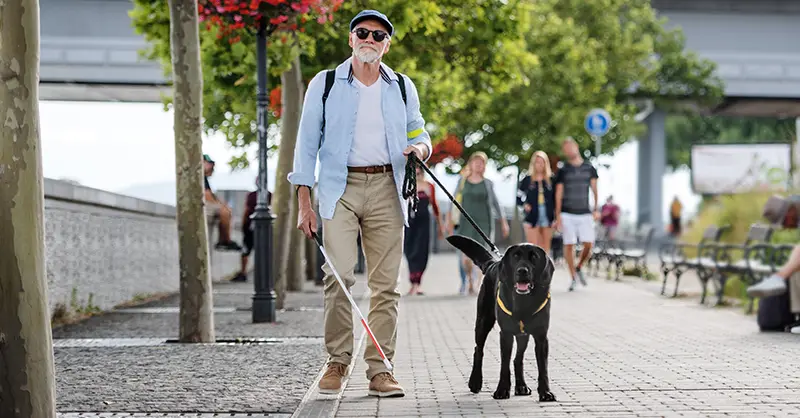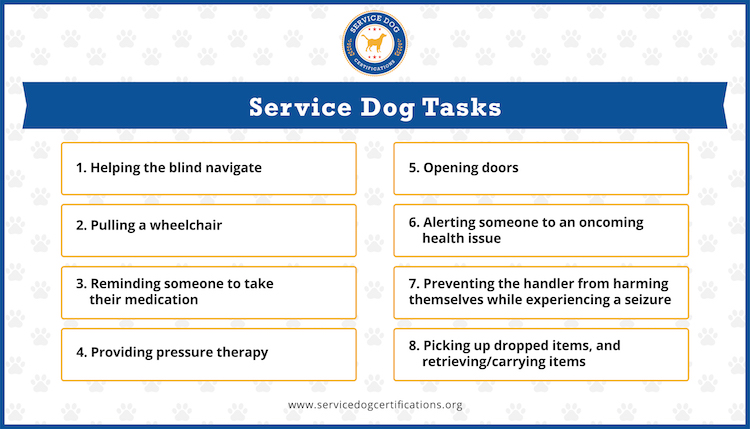Home Page › Blog › The Benefits of a Service Dog for Seniors
The Benefits of a Service Dog for Seniors

Service dogs have been used since the mid-1940s for those with visual impairments. Today, the service dog has expanded into an even more significant role, especially for seniors, so much so that most senior living communities openly welcome these furry members.
Let’s explore the benefits of a service dog for seniors.
What is a Service Dog?
There may be some confusion between a service dog, a therapy dog, and an emotional support animal. A service dog is specifically trained to perform a task for its human handler. A therapy animal visits people in hospitals or nursing homes, and an emotional support animal is an untrained animal that offers comfort to a person, usually for mental or emotional health disorders. All these animals play an important role for the right individual.
To own a service dog, a senior must have a qualifying disability and need for a task trained service dog that assists with symptoms of that disability.
Service dogs are protected under federal laws. The Americans with Disabilities Act (ADA), for example, enables service dogs to follow their handler anywhere accessible to the general public, even in areas where other dogs are not allowed. Service dogs are provided access because they are critical to the health of their handler.
Other federal laws protecting service dogs are:
- Housing and Urban Development’s Fair Housing Act (FHA). Under the FHA, service dogs can live with their handlers in “no pets allowed” housing, free from fees and discrimination.
- Transportation Department’s Air Carrier Access Act (ACAA). The ACAA allows service dogs to fly in an airplane’s cabin with their handler without fees.
Along with these federal laws, some states also have laws that pertain to service dogs.
Show everyone that the rights of your service dog should be respected. Get your service dog registered below.
Service Dogs and the Visually Impaired
The Guide Dog Foundation was created in 1946 with a specific goal:
“to allow visually impaired individuals to live without boundaries.”
This program works tirelessly to match the perfect dog to the individual based on personality, mobility, physical needs, and lifestyle. When the right service dog and handler are paired, it creates an unbreakable bond.
But this is just one area where the service dog is invaluable. Seniors without visual impairment may also have a need for a service dog.
Service Dogs and the Aging Body
As we age, we are prone to developing other disabilities such as impaired hearing, diabetes, seizure disorders, and limited mobility. Service dogs can be specifically trained to aid seniors in all these areas, such as alerting the handler to a drop in blood sugar, an oncoming seizure, or simply the telephone ringing or the sound of the doorbell. Larger service dogs are also perfect for providing support with mobility issues or picking up dropped items.

Service Dogs and the Aging Brain
It’s been proven that just spending time with a dog can lower blood pressure, release feel-good endorphins, and reduce anxiety and depression.
As a person ages, they may experience some mental health issues, from a mild case of forgetfulness to dementia or Alzheimers. Some seniors may also suffer from depression, anxiety, or PTSD. Service dogs can reduce or even alleviate some of the symptoms of these conditions.
A study of people with Alzheimer’s concluded that patients who spent time with a simple therapy dog could recount memories and feelings, which helped to improve their overall quality of life.
To further this idea, the Dementia Dog Project that was developed by students at the Glasgow School of Art and supported by Alzheimer Scotland, Dogs for the Disabled, and Guide Dogs Scotland, showcases that:
“Service dogs can help people with dementia maintain their waking, sleeping, and eating routine, remind them to take medication, improve confidence, keep them active and engaged with their local community, as well as providing a constant companion who will reassure {them} when facing new and unfamiliar situations.”
Service Dogs and the Senior’s Mental Health
Service dogs can also be trained to assist with mental health disabilities. For example, they can remind handlers to take medication, provide pressure therapy during moments of crisis or break dissociative “spells” by barking or licking. Service dogs also provide seniors with other mental health benefits, including;
- Enhanced confidence and self-esteem
- Decreased levels of anxiety and depression
- A decrease in some senior-related behavioral issues
- A sense of comfort and safety
- Increase in socialization with other people.
Service Dogs and the Senior’s Physical Health
Some seniors have trouble maintaining physical activity. Service dogs can be trained to assist with limitations in movement. Service dogs can also help promote activity by going for walks each day and encouraging the person to play with the canine.
Other potential physical benefits of a service dog are:
- Increase in muscle tone and strength
- Increase in bone strength
- Improved balance
- Improved circulation
- Improved overall cardiovascular health – lowered risk of heart attacks and an increased survival rate among patients who have experienced one.
Seniors and Service Dogs
If you or a loved one is a senior, you may consider getting a service dog. These specially trained canines can help with everyday tasks, alert to oncoming medical issues, or be there to lend a furry paw for comfort, companionship, and exercise.
You do not need any type of documentation to prove you own a service dog, such as a certificate, vest, registration, ID or license. However, many senior service dog owners find these accessories helpful when they want to signal to members of the public that they own a service dog, and not just a regular animal.
About the Author: The writing team at Service Dog Certifications is made up of folks who really know their stuff when it comes to disability laws and assistance animals. Many of our writers and editors have service dogs themselves and share insights from their own experiences. All of us have a passion for disability rights and animals.
Latest Posts

How to Bring a Service Dog to Disneyland
Trained service dogs are more than welcome to join their handlers at Disneyland. In this guide, we’ll explain Disneyland’s policies and give practical advice for bringing a service dog to Disneyland for the first time. Disneyland’s Service Dog Policies The Magic Kingdom is happy to welcome trained service dogs across most park locations! They kindly […]

Read More

Can Dogs Eat Tomatoes?
Yes! Dogs can safely enjoy tomatoes, but there are a few risks to be aware of so you can feed your dog responsibly. Fully ripe tomatoes (without the stems and leaves) can actually have nutrients that are good for your pup. Tomatoes have chlorogenic acid, an antioxidant that can have anti-inflammatory effects in cells. They’re […]

Read More

Can a Primary Care Doctor Write an ESA Letter?
Your family doctor, also called a primary care physician (PCP), can write a letter recommending an emotional support animal. We’ll explain what legally gives them that ability and explore what better options might be available for you. Why are Physicians Able to Write an ESA Letter? To turn your pet into an emotional support animal, […]

Read More








